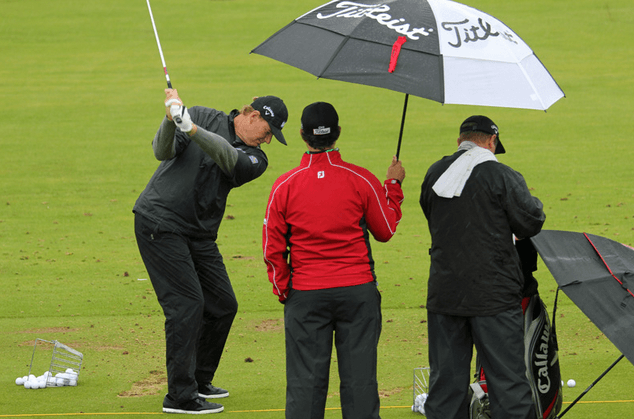
During each practice session, no matter what you are practicing, I recommend dividing it (equally) into the 3 following types of practice:
• Block practice (technical)
• Random practice (playing skills)
• Competitive skills practice (pressure practice)
By doing this, you will:
• Improve your technical skills
• Store a larger repertoire of shots to your unconscious memory, so you can adapt to varying conditions
• Improve your Golf I.Q.
Block practice is the way most golfers practice. It’s when you repeat the same movement over and over, until the brain starts to lay new (or strengthen existing) neural pathways making the movement automatic.
But there’s focused block practice, and mindless block practice. Each rep should (to be most effective) be highly focused on a specific area of your swing or stroke that you are trying to improve.
But there’s a problem with doing block practice exclusively, which is the trap that many golfers fall into.
When you hit ball after ball at the same target, your body quickly learns and adjusts to play the shot with ease. As Ben Hogan once said, you get into “Range Rhythm”. But with many golfers being “ego golfers”, hitting the ball great on the range is highly enjoyable. But unfortunately, there’s an “illusion of competence”. We finish the session feeling confident, believing we are better players. However, the reality is quite different. There hasn’t been a whole lot of “playing” skill development, and that false sense of competence raises expectations ahead of playing the course. This is why an effective practice session includes Random Practice.
Random Practice, is where you hit different shots to random targets, such as a driver to one target and then a 7-iron to another (no two consecutive shots are the same). What this does is train your brain to adapt quickly – you have to think on the fly. With each shot you have to solve a new problem which quickens learning and makes it easier to recall that same motor sequence in the future. Daniel Coyle (in his book “The Talent Code”) calls this “Deep Practice”.
Random Practice not only makes your practice sessions more effective, but it increases engagement and makes it more fun. E.g. when I’m working with juniors on the range it keeps them far more interested to hit each shot like they are on the course, instead of hitting the same shot over and over again (doing this they quickly lose interest).
Here’s an example of a Random Practice Drill. There’s plenty more in the Golf State of Mind Practice Drills eBook.
“The Nine Shots” Random Practice Drill
During your driving range session, attempt to hit all of these nine shots (ideally to different targets and with different clubs). This could also be thought of as a competitive practice drill (one where you test yourself with a challenge).
- High fade
- Regular fade
- Low fade
- High Straight
- Regular Straight
- Low Straight
- High draw
- Regular draw
- Low draw
Hitting The Nine Shots random practice drill involves moving the ball around in your stance, changing your alignment, swing path, and learning the effect of opening and closing the club-face through impact. Learning to play these shots is going to develop a better understanding of what produces difference ball flights, and storing motor patterns which you’ll be able to recall on the course.
Another Random Practice Drill
If The Nine Shots drill seems a bit too advanced, you can try plenty of other random drills. E.g. simply “play the course”. Hit no more than one shot with each club and go through your full routine for each shot. Although this will take longer and you’ll hit less shots, the random element of this practice will make sure your learning is deeper and your time is spent more effectively. You can obviously do this with putting and short game (hitting to different holes and pins without hitting the same putt or chip).
With this continued practice comes quick improvement of a key skill: adaptability. On the golf course you never hit the same shot twice, you have to adapt to different situations continuously throughout the round, so why not get better at this with random practice. If you do, you’ll definitely see an improvement in your scores.
Competitive Skills Drills are all about putting pressure on yourself. Whether it’s friendly betting games or games where you have to beat a certain score, in these drills you’re simulating the pressure you feel on the course and learning how to control focus, tempo and tension.
Photo courtesy of Tour Pro Golf Clubs
